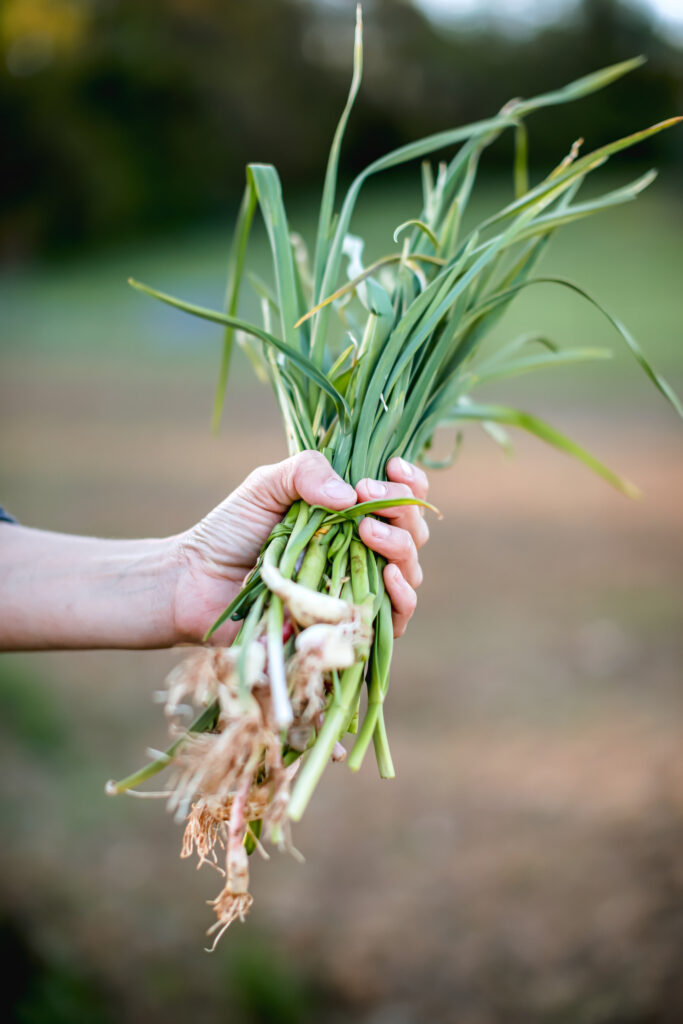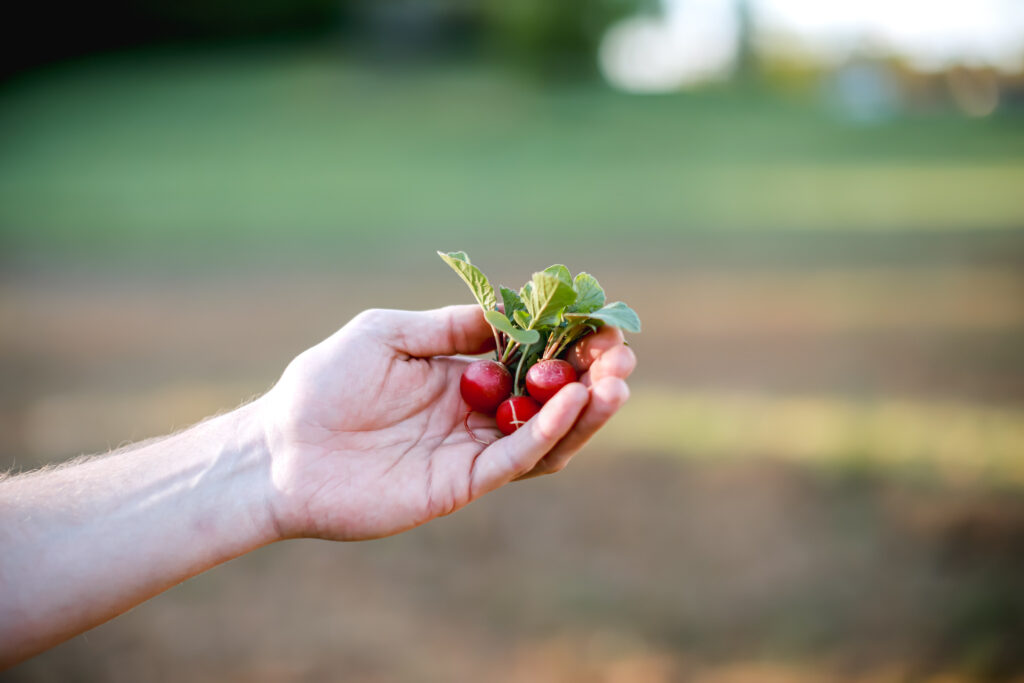Discovering a Sense of Place: Artemisia Farm & Vineyard
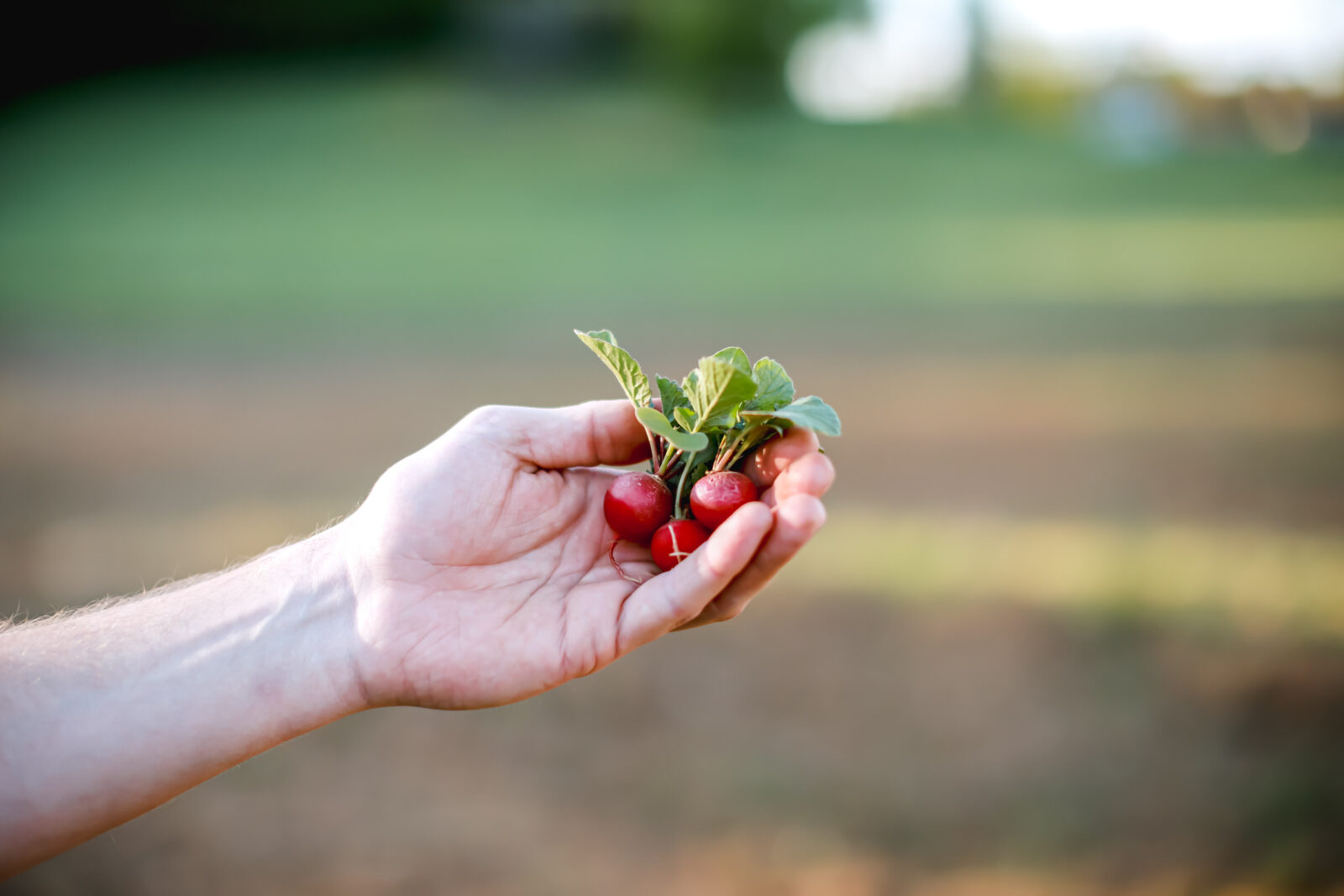
Written By Chelsea Rose Moore | Photos By Jennifer Gray
The American novelist and essayist Wendell Berry wrote, “Eating is an agricultural act.” But for many, the act of eating carries no connection to the local agricultural landscape.
Many Americans purchase food shipped from another state at big-box stores, with no thought given to the process of how it was made or prepared, or in the case of meat, the life it lived before arriving at the store. This is the bleak American food landscape.
But two farmers in Delaplane, Andrew Napier and Kelly Allen, are working to change this narrative. They started Artemisia Farm & Vineyard in the summer of 2019 to revitalize Virginia’s rural food landscape, “shifting the agricultural focus from industrial to local.”
“We’re trying to create a new dynamic for viticulture and agriculture,” said Allen. “When you think about food and local production—even if it’s a craft, like wine or jam—that kind of local production is the heartbeat of a community and a culture. Once we lose touch with that, we lose part of our identity. It’s important as an individual and as a greater culture.”
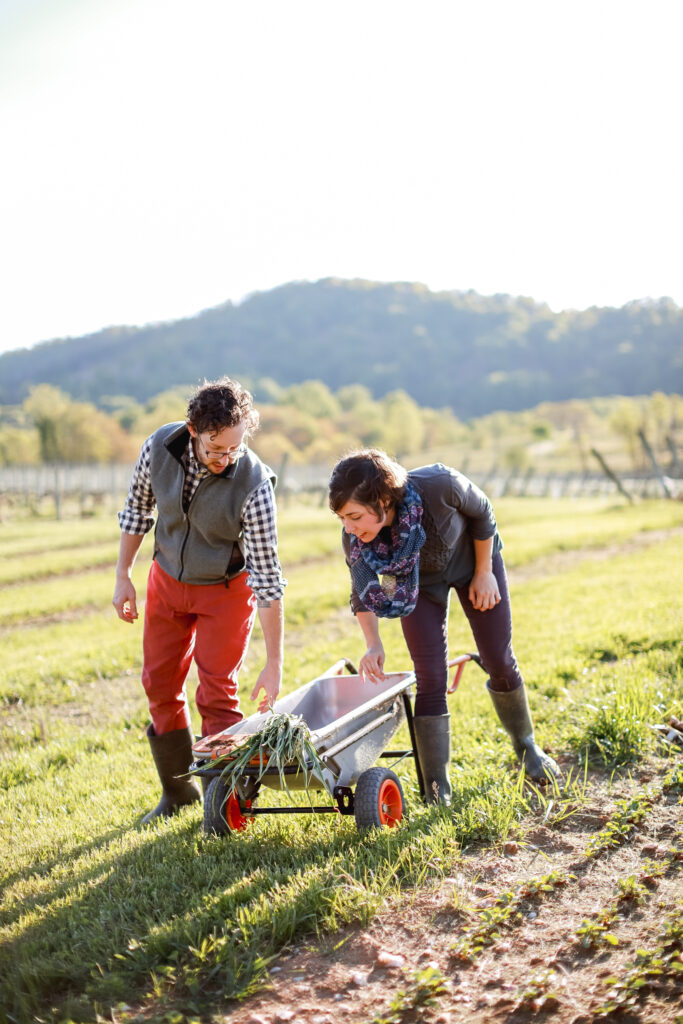
With eight acres under vine (North American hybrid grapes), they’re restoring and rehabilitating the vines using sustainable practices. Instead of opening their own winery, they will sell the grapes to other wineries. They’re creating a “new genre of viticulture” they hope will define the Mid-Atlantic region. One of their practices is “growing the right crops for the right place,” said Napier, “not European vines.”
They’re also working a farm, which provides a steady income and enables them to connect more deeply to the community by providing healthy food to their neighbors. From radishes to bok choy, peppers to eggplants, they’re growing heirloom crops native to the region, thus preserving Virginia’s culinary heritage.
They offer a CSA (Community Supported Agriculture) and have reached maximum capacity for the season. When they started, they were marketing to local restaurants and wineries. “We had a long list of restaurants and wineries that wanted to work with us, but then COVID-19 happened,” said Allen. “We wanted to switch to the CSA for more socio-cultural reasons, ensuring people have access to local foods without going to the store.”
They’re grateful to be able to provide nourishment for their neighbors, and they’ve partnered with three locations for pickups: The Whole Ox in Marshall, The Wine Attic in Clifton, and Crystal City Wine Shop in Arlington. Each location offers curbside pickup or a socially distant delivery.
The name Artemisia stems from the Latin genus for “wormwood,” a plant they plan to introduce to the farm and use to produce absinthe. “Wormwood is a plant that is between the wild and the domesticated,” said Allen. “That’s the theme of what we really wanted to do,” said Napier. “[We are] halfway between wild and cultivated, which is what you find in sustainable models of farming and in the wild.”
Meet The Farmers
Allen and Napier are partners both in business and in life.
Allen always had an interest in the outdoors. As a child, she wanted to be a paleontologist (“But I’m still digging in the dirt!” she said), and then she wanted to be a park ranger. She has a degree in sustainability and served in AmeriCorps VISTA teaching arid-lands agriculture at the Institute of American Indian Arts in Santa Fe, New Mexico. Before pursuing the life of a sustainable viticulturist, she worked in wine sales. She’s a published author, with her most recent work “Brettanomyces” available on Amazon and in major bookstores.
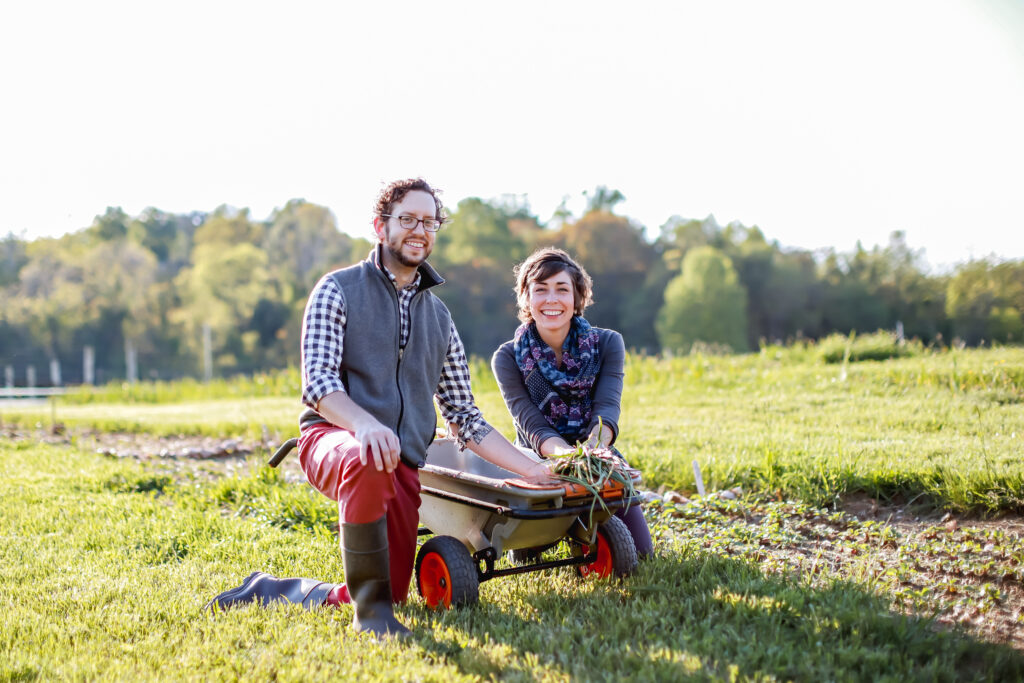
Napier’s story began in his grandparents’ backyard. His grandfather, born into a family of orchardists, maintained a large garden and grew cherry trees in his yard. “We really celebrated the bounty and wonder of nature,” said Napier.
He pursued a degree in theatre that opened his eyes to the importance of storytelling as a way of connecting to oneself, the past and the future. But it was his early exposure to gardening and nature that brought him to the food and wine industry. After working in restaurants for a decade, he took a job at Linden Vineyards, where he learned the ins and outs of the wine industry. He went on to manage the wine program at The Whole Ox, deepening his love of viticulture.
“I see that food, wine and the farming of those is the story we want to tell everyone in our community,” he said.
“Wine is not simply the solution of alcohol and water. Food is not something that springs forth in the supermarket,” said Allen. “All of these things have stories.”
Their love for storytelling extends beyond the practice of farming. It’s engrained into who they are, the way in which they share their narrative, and their view of life itself. Their website, filled with beautiful images and poetic descriptions, feels like a storybook, and their explanations of the natural world are almost lyrical. Their eye for beauty and love for language is contagious.
They want to develop programs to educate children about farming, with the goal of sparking curiosity and a love for the natural world. In the future, they hope to work with schools to offer educational programming.
They also plan to host classes for adults. One example is a winter pruning class, where Allen and Napier will explain the lifecycle of the vines. They’re bursting with ideas for classes and events once the coronavirus pandemic passes.
The Coronavirus Pandemic
While uncertainty is part of any small business venture, the past few months have been a wild ride. Allen voiced her concern about the void local wineries and restaurants would leave if they closed, describing small businesses as “our cultural narrative.”
“Restaurants and retail shops are the gatekeepers of everything,” said Napier. “Without them, so many people are left stranded. People have to go to a supermarket and wonder if things will be available. There’s a way to do that: It’s through small shops and farms.”
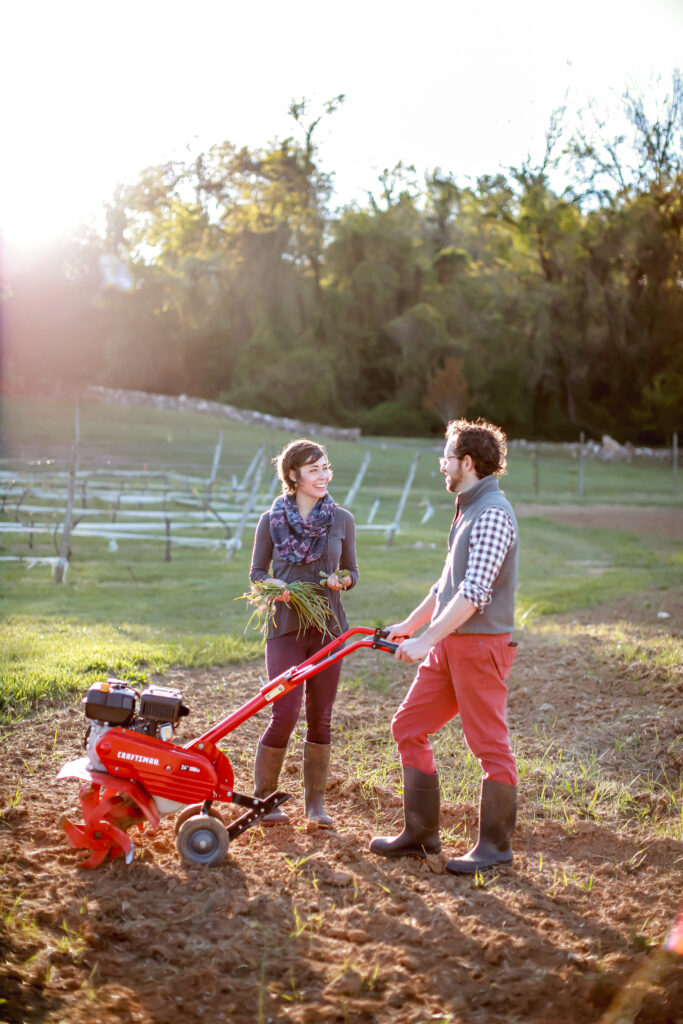
The lockdown required Allen and Napier to rewrite their business plan in two days, pivoting to meet changing needs. The Artemisia CSA has supported their efforts to restore the vineyard.
Allen’s days are defined by “peacefulness,” a word not often heard when describing one’s job. “I have my hands in the vines; there are animals and sunshine,” she said. “It feels really human. It feels like this is what we were designed to do. It’s really a gift to have that.”
Napier outlined his favorite part of his days. “Being present with nature, being grateful for the bounty of what nature provides to us, being in tune with the cycles of life,” he said.
Artemisia Farm & Vineyard is located at 3663 Double J Lane, Delaplane, Virginia. Visit their website at artemisia.farm and find them on Instagram @artemisia.farm. ML
This article first appeared in the June 2020 issue of Middleburg Life.


